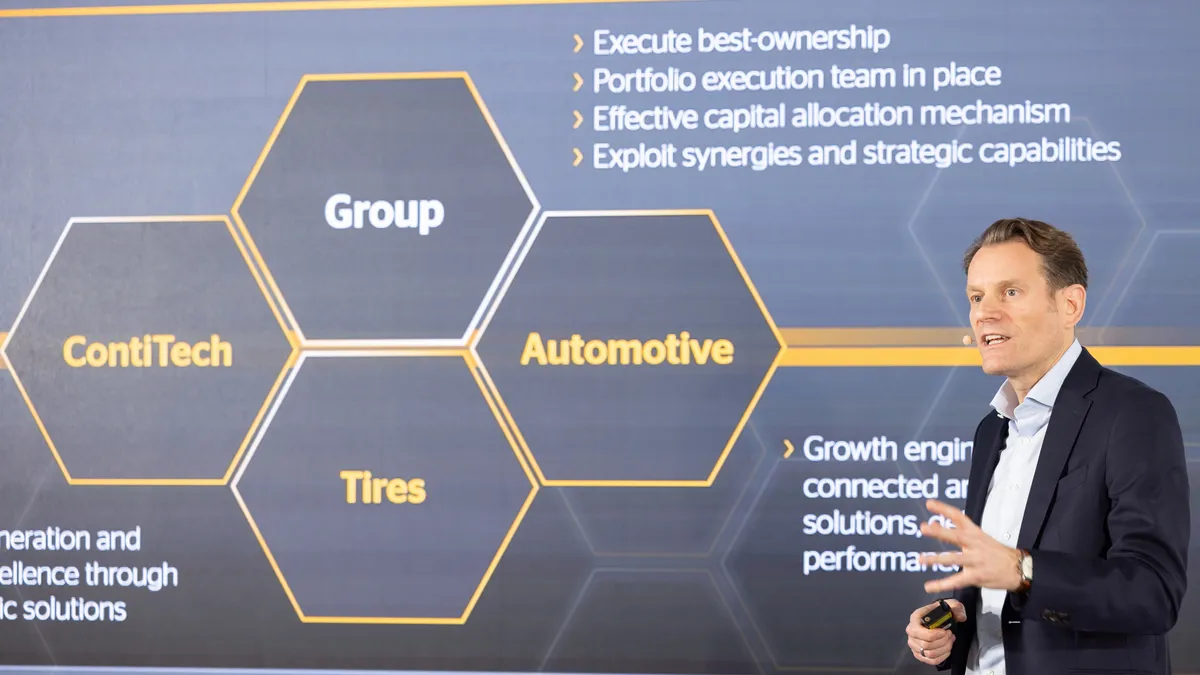Dive Brief:
- Continental laid out its new strategy for increasing margins and growing sales across its three core industries — parts, tires, and rubber and plastics — during the company’s Capital Market Day on Monday.
- The plans include Continental making its User Experience business within its automotive sector independent, as well as other cost-reduction measures across the company to improve margins and boost total sales to around 44 billion euros to 48 billion euros ($47.7 billion to $52 billion) over the next two or three years, and by 51 billion euros to 56 billion euros in the next three to five years.
- The changes come after Continental said last month it would lay off employees and reduce its automotive business from six to five units.
Dive Insight:
Continental continues to restructure its automotive business unit. By spinning off its User Experience business into an independent unit, the auto supplier said it will open up growth opportunities for its displays and HMI controls business, which includes products such as vehicle head-up displays and digital instrument clusters.
Overall, the company is trying to reduce costs of its automotive 400 million euros a year starting in 2025, with measures that include simplifying administrative processes and decision-making structures. Continental says its updated business strategy should help it post a consolidated adjusted EBIT margin of around 8% to 11% in the next two to three years.
Continental is also reviewing plans to boost its automotive business to reach consolidated sales of 1.4 billion euros the current fiscal year.
The auto supplier is planning to lower research and development expenses for its automotive business to around 11% of total sales from the current 12% in 2023, in the short term. The R&D expenses are expected to be less than 10% in the medium term. This includes consolidating 82 development locations worldwide, according to the press release.
“Our strategy aims to increase our value creation. This will allow us to continue to develop into the mobility and material technology group for safe, smart and sustainable solutions,” said Continental CEO Nikolai Setzer, in a press release.
Last month, Continental announced plans to dissolve its Smart Mobility business and fold it into its other auto units. The Smart Mobility unit is currently focused on vehicle architecture and networking, autonomous mobility, safety and motion, software and central technologies, and user experience.
While Continental said it wants to increase the share of sales of its ContiTech group from roughly 55% to 80%, there were reports in August the supplier is actually looking to sell off the automotive division. ContiTech manufactures industrial and automotive rubber, plastic, metal and fabric components.
Continental said its tire business is performing strongly, with sales growing by around 4.3% each year. The company aims for sales of around 17 billion to 18 billion euros with an adjusted EBIT margin of around 13% to 16% for its tire business in the next three to five years.
“Achieving our mid-term targets is a priority,” Continental CFO Katja Garcia Vila said in the press release. “To do so, we have a clear plan that we will implement rigorously.”













